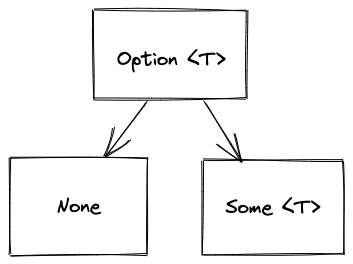Option
typescriptfp-tsalgebraic structuresJuly 18, 2021
This is a series of articles where I’m attempting to describe most common algebraic structures implemented by fp-ts library:
- Part 1: Semigroup
- Part 2: Monoid
- Part 3: Equality and Ordering
- Part 4: Option
Option
An Option represents a container for a value which might be missing. It’s a sum type of two possible types: None | Some<T>

When talking about missing values, Javascript models this natively with null or undefined values. This comes with its own problems and 8 out of 10 most common Javascript errors1 are in some way related to null or undefined. The creator of NULL (and Quicksort), Tony Hoare, also calls it “the billion dollar mistake”2. So, in order to avoid dealing with null and undefined and all the safety checks we must do when working with them, we can work with Option.
Since the Option is a wrapper around a value, the only way to access it is to handle both success and failure cases.
import * as O from "fp-ts/Option"
const getMaybeNumber = (): O.Option<number> => {
const randomNumber = Math.random()
return randomNumber > 0.5 ? O.some(randomNumber) : O.none
}
const value: number = pipe(
/* get Option<number> */
getMaybeNumber(),
/* pattern match on the value */
O.match(
() => 0, // handle None case
success => success // handle Some<number> case
)
)
Since getting the value or some default is a very common pattern, there’s an even simpler way to achieve that:
const _value = O.getOrElse(() => 0)(getMaybeNumber())
// or more elegantly
const value = pipe(
getMaybeNumber(),
O.getOrElse(() => 0)
)There are a couple of ways we can build an Option:
// using constructor
const valueNone = O.none
const valueSome = O.some("hello")
// from a value
const valueNone2 = O.fromNullable(null) // O.None
const valueSome2 = O.fromNullable("hello") // O.Some("hello")
// from a predicate function
const isHigherThanTwo = (n: number) => n > 2
const valueNone3 = O.fromPredicate(isHigherThanTwo)(1) // O.None
const valueSome3 = O.fromPredicate(isHigherThanTwo)(3) // O.Some(3)If we need to get out of the functional word and again deal with Javascript values, we can easilly convert Option to null or undefined:
const valueNone = O.none
const valueSome = O.some("hello")
O.toUndefined(valueNone) // undefined
O.toUndefined(valueSome) // "hello"
O.toNullable(valueNone) // null
O.toNullable(valueSome) // "hello"We can combine what we learned about Eq in the previous article and derive an Eq for an optional value and use it to compare optional Product.
import { Eq } from "fp-ts/lib/Eq"
import * as O from "fp-ts/Option"
// Implemented for demonstration, but available as O.getEq
const getEq = <T>(E: Eq<T>): Eq<O.Option<T>> => ({
equals: (first, second) => {
if (O.isNone(first) && O.isNone(second)) {
// both are none, so they are equal
return true
}
if (O.isSome(first) && O.isSome(second)) {
// both are some, so compare equality
return E.equals(first.value, second.value)
}
return false
},
})
// defined in previous article
export const EqProduct: Eq<Product> = struct({
name: S.Eq,
price: N.Eq,
categories: A.getEq(S.Eq),
})
const EqOptionalProduct = getEq(EqProduct)
const product1 = {
name: "product",
price: 100,
categories: [],
}
const product2 = {
name: "p",
price: 200,
categories: [],
}
const product3 = {
name: "product",
price: 100,
categories: [],
}
EqOptionalProduct.equals(O.none, O.none) // true
EqOptionalProduct.equals(O.none, O.some(product1)) // false
EqOptionalProduct.equals(O.some(product1), O.none) // false
EqOptionalProduct.equals(O.some(product1), O.some(product2)) // false
EqOptionalProduct.equals(O.some(product1), O.some(product3)) // trueSimilar to how we’ve been able to get Eq<Option<T>> just by having Eq<T> (by using getEq in the above snippet), we can also obtain Semigroup<Option<T>> if we have Semigroup<T>. This kind of composability is very useful and it’s usually called “lifting” or “applying”. Extending the code we’ve written in the first article about Semigroups, we can create a merging strategy that can deal with optional Product values:
import { struct, Semigroup } from "fp-ts/Semigroup"
import { getApplySemigroup } from "fp-ts/lib/Apply"
import * as O from "fp-ts/Option"
// Defined in the first article
const ProductSemigroup: Semigroup<Product> = struct({
name: KeepLongerName,
price: KeepLowerPrice,
categories: MergeCategories,
})
// Use Option's apply to lift Semigroup<Product> to Semigroup<Option<Product>>
const ProductOptionalSemigroup = getApplySemigroup(O.Apply)(ProductSemigroup)
const mergeProducts = concatAll(ProductOptionalSemigroup)(
O.some(defaultProduct)
)
const product1 = { name: "product", price: 50, categories: ["hello"] }
const product2 = { name: "product longer", price: 100, categories: [] }
mergeProducts([O.none, O.none]) // O.none
mergeProducts([O.none, O.some(product1)]) // O.none
mergeProducts([O.some(product1), O.some(product2)])
// O.some({ name: 'product longer', price: 50, categories: ['hello'] })